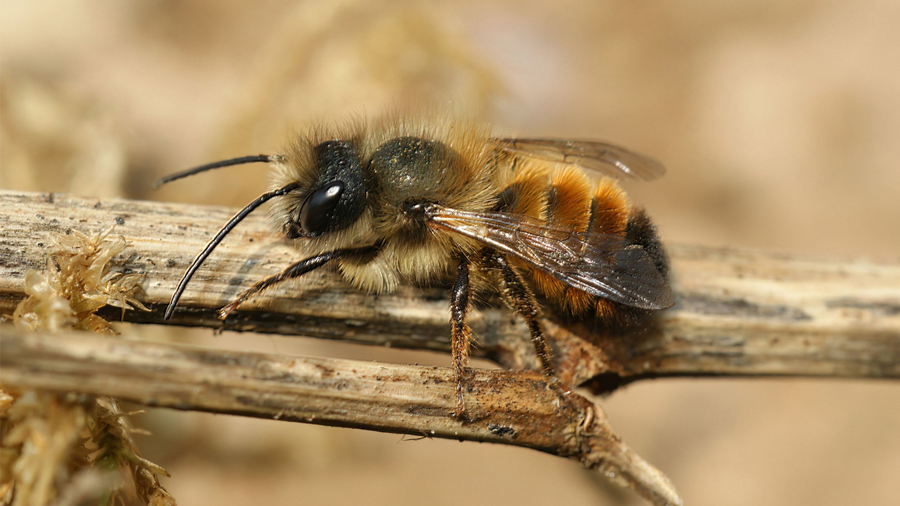Bees more sensitive to pesticides due to climate change
A study led by CREAF and the UAB, and published in Global Change Biology, discovered that warmer winters worsen the impact of pesticides on bees and reduce their life expectancy by 70%, causing severely negative effects on the population and a sharp decline in the number of pollinators.

Highly significant declines in bee populations have been observed in recent decades, linked to factors such as climate change, changes in land use, the arrival of new natural enemies, or the use of pesticides. Previous studies have shown that these stress factors do not act in isolation, but interact with each other and can be a deadly cocktail for bees. Now, a study led by researchers from CREAF and the Universitat Autònoma de Barcelona confirms exactly this: researchers conducted an experiment showing that the increase in temperatures during the winter causes solitary bees of the genus Osmia, important pollinators of fruit trees, to be more vulnerable to the effects of pesticides and to have a shorter life expectancy.
"We have observed that in the worst of the two simulated temperature increase scenarios, bees live about 5 days less than under normal conditions. This may seem like a small difference, but in life spans as short as those of Osmias (approximately 20 days), this can have devastating consequences on a population scale,” explains Sergio Albacete, lead author of the study and predoctoral researcher at CREAF and the UAB.
Multiple intoxications
The study analysed the effects of the interaction between climate change and pesticides by exposing the wild bee Osmia cornuta to two realistic scenarios of increased winter temperatures and sub-lethal doses of the insecticide Sulfoxaflor.
The results demonstrate a synergistic interaction between climate change and pesticide exposure. Bees that were not exposed to warm temperatures during the winter experienced a 50% reduction in life expectancy when they ingested the highest dose of insecticide. When this same exposure was combined with the most pessimistic climate change scenario, the reduction in life expectancy reached 70%. "Increased temperatures during winter cause Osmias to consume their energy reserves and deplete their fat bodies. These fat bodies play a crucial role in the detoxification process of substances such as pesticides. Therefore, we assume that bees with lower energy reserves are more sensitive to the effects of these pesticides,” says Albacete.
In addition to effects on longevity, exposure to warmer winters and sublethal doses of the insecticide also affected the light responsiveness and foraging behaviour of the bees. “It should be kept in mind that, although the levels of insecticide to which bees are exposed during flowering are generally not sufficient to cause death, they can have effects on their physiology and behaviour and, therefore, on their reproductive success,” Albacete points out.
European legislations and bans
In order to protect pollinators, the use of the vast majority of insecticides is prohibited during the flowering period. However, it should be noted that many of these products are persistent and, despite being applied at stages prior to flowering, can appear in the pollen and nectar of treated crops. Moreover, “the effects observed in the experiment are the result of exposing bees to a realistic dose of a specific insecticide, but in agricultural systems, bees are chronically exposed to a wide variety of agrochemicals (insecticides, fungicides, herbicides, etc.), so their survival is even more complicated”, warns Anselm Rodrigo, researcher at CREAF and the Department of Animal Biology, Plant Biology and Ecology at the UAB and also co-author of the study.
Although this study has used future climate scenarios based on IPCC standards, the exposure conditions used can already be considered realistic and current. "The temperatures of our most pessimistic climate scenario have already been seen in the past few years with particularly warm winters. Therefore, the impacts observed in our study may already be affecting wild pollinator populations today”, concludes Jordi Bosch, CREAF researcher and co-author of the study.
The Institute of Evolutionary Biology (CSIC-Universitat Pompeu Fabra) and the University of Bologna, Italy, also participated in this research. According to the authors, studies such as this one highlight the need to consider multiple stress factors to understand declines in bee populations. The results also highlight the importance of revising the toxicity thresholds defined in the risk assessment of pesticides in European legislation, since bee populations are facing increasingly warmer temperatures, and these thresholds may not be sufficiently protective.
Original article: Albacete S, Sancho G, Azpiazu C, Rodrigo A, Molowny-Horas R, Sgolastra F, Bosch J. Bees exposed to climate change are more sensitive to pesticides. Glob Chang Biol. 2023 Nov;29(22):6248-6260. DOI: 10.1111/gcb.16928. Epub 2023 Sep 1. PMID: 37656005.